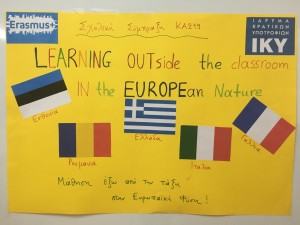The rationale of this project is a result of the previous project Erasmus+ KA1 School Education Staff Mobility entitled “The pre-primary school 1 Nipiagogeio Voulas organizes learning in the outdoors” which was based on the theoretical and practical knowledge of a seminar “Outdoor arts and crafts” in Iceland. The interest of the participants in that seminar to share their experiences from previous Comenius projects, scholar partnerships and mobilities (for example the seminar with the title “The garden, a living monument. Heritage education gardens in Europe”) and their desire to work together in Outdoor Education, led to further discussions to organize a partnership.
The teachers from Northern Europe Estonia are well specialized in educational activities out in the nature. It is very interesting to exchange their good practices relating to teaching in the open and natural environment, that are already implemented in their education system. The partners from France and Italy can share innovative methods in cultural and art activities in the outdoors, as they have experience from projects who identify tools and practical training approaches, which facilitate the implementation of education of European garden and landscape art history. The applicant organization from Greece has a long experience in European projects and has theoretical knowledge regarding the outdoor education, but not so much practical experience, neither has Romania, as such activities are not very common in these education systems. Working together with European partners broadens the intellectual horizons of the teachers and improves the educational framework of all the participant institutions.
Therefore this strategic partnership will be a collaboration between pre-primary schools from different education systems, different landscapes, with different languages, but all the partners are united in their true interest and care for the natural environment and the sustainability of our planet.
The scale and nature of outdoor education practices varies between countries. Perception of nature, climate, open-air leisure traditions, landscape qualities, risk assessment and local economy are often defining factors. The level of planning, organisation, complexity and significance to curriculum differs. Some countries have an extensive tradition with “outdoor education” and they enrich school experience. While in other cultures the use of outdoor venues is a mean to compensate for lack of indoor facilities. Outdoor education is sometimes used to challenge the pupils endurance and skills through longer journeys, whilst in other situations it can be a single lesson with a relaxed/simple task.
In many countries there are dedicated centers for outdoor education, with highly qualified staff. In some cultures it is important to learn about the environment, outside. For others it is a venue of challenge. Then there is those who choose the open sky as the classroom, for regular curriculum. It is important for our partnership to study and work on these different factors. We will explore and share new innovative methods in teaching maths, sciences, literature, poetry in the outdoors and also in creating arts, playing drama with the open sky as our roof.
The current economic and social situation in Europe creates the necessity to form a project that, through interaction with nature, will promote the development of creativity, improve health and well being, and provide emotional uplift to teachers, students and their families. This partnership aims to seek alternative practices that do not require expensive equipment to be applied in the daily schedule, but utilize natural resources. In addition to these objectives of the project is to change approach and behaviors of European students who have frequent occurrences of obesity and other health problems because of excessive inactive life, as they were born and raised along with technology in a digital environment full of personal computers, mobile phones, gaming systems, MP3 players etc and they are not often out in the nature.
Moreover it aims at pointing out the importance of the outdoors for the children’s holistic development (personal and social) through practical ideas for early childhood education, it emphasizes the adoption of public spaces as “our spaces” in an attempt to form responsible and active citizens.
This project should be carried out transnationally, as it is necessary to share good practices that enhance the quality of early childhood education, which is so critical for the development of children’s personality. Outdoor education can accommodate almost any topic in a regular curriculum and sharing transnationally new methodology with inspiration can give to every partner great results.
This project will promote the dissemination of the best pedagogical practices of outdoor education among teachers of early childhood education at local, regional, national and international level.

